|
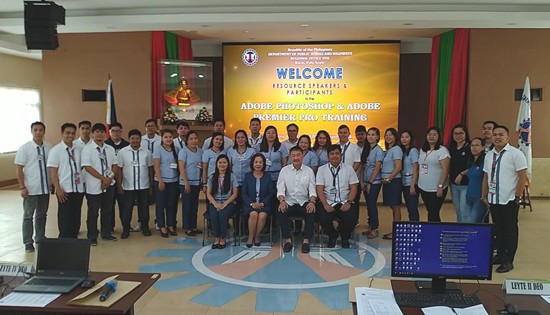
Different
District Engineering Offices (DEOs) personnel of DPWH Region
VIII including that of the Regional Office undergo a
training on Adobe Photoshop and Adobe Premiere Pro Training
at DPWH-Regional Office VIII Baras, Palo, Leyte on January
13-17, 2020. |
DPWH-8 conducts Adobe Photoshop and Adobe Premiere pro training
By
DPWH-Biliran
January 31, 2020
NAVAL, Biliran –
The Department of Public Works and Highways (DPWH) Region VIII has
conducted Adobe Photoshop and Adobe Premiere Pro Training on January
13-17, 2020 held at DPWH-Regional Office VIII Baras, Palo, Leyte.
Selected employees from
Biliran District Engineering Office (DEO) along with other 12 DEOs
including that of the Regional Office attended the said training to
enhance their knowledge on basic photo and video editing skills.
Biliran DEO were
represented by Ms. Melanie Sison and Engr. Carl Mark D. Pedrera.
The training started with
the registration followed by the introduction of the participants by
Virginia L. Talde, Chief of Administrative Division. Assistant
Regional Director Walter F. Lubiano, on the other hand, introduced
the speakers for the training.
Before the lecture
started, a group activity was conducted regarding what to expect
from the training, what to expect from the speakers and what can you
contribute. Every group brought up different ideas in which they
thought would fit in that category.
The speakers for the
entire training were Ms. Gina Guijarno and Mr. Kim Rainier Almazan,
both are Information System Analyst I of the Information Management
Service (IMS), DPWH Central Office.
After discussing the
training rules, the participants filled up the pre-training survey
about their initial knowledge regarding photoshop and premiere.
On the first and second
day, the lecture is all about the basics of Adobe Photoshop which
tackles on the Image Adjustment, Layers and Selection Tools. Ms.
Guijarno gave the participants some exercises which further enhances
their new-found knowledge by changing the adjustments of the
pictures.
For the second day, the
lecturers learned how to edit videos through Adobe Premiere Pro and
also acquired techniques in producing a good video output.
Lastly, on the fifth day
was allotted for the final exercise which involves the making of
their own newsletter and producing a video which showcases their
districts projects and the accomplishment of post-training survey of
what they learned from the seminar.
The goal of the training
is to familiarize the said programs so that it can be used for the
benefit of their respective districts.
1 in every 4
families in Eastern Visayas is poor
By
PSA-8
January 31, 2020
TACLOBAN CITY –
Poverty incidence among families in Eastern Visayas in 2018
significantly improved to 24.0 percent from 32.9 percent in 2015.
This implies that in 2018, around 1 in every 4 families in the
region is poor or has income below the poverty threshold, which is
the amount required to meet basic food and non-food needs.
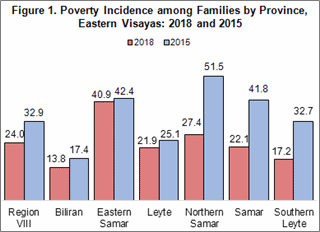 In 2018, poverty incidence
among families in Eastern Samar was estimated at 40.9 percent;
Northern Samar at 27.4 percent; Samar at 22.1 percent; Leyte
(including Tacloban City) at 21.9 percent; Southern Leyte at 17.2
percent; and Biliran at 13.8 percent.
In 2018, poverty incidence
among families in Eastern Samar was estimated at 40.9 percent;
Northern Samar at 27.4 percent; Samar at 22.1 percent; Leyte
(including Tacloban City) at 21.9 percent; Southern Leyte at 17.2
percent; and Biliran at 13.8 percent.
Significant improvements
in poverty incidence among families between 2015 and 2018 were noted
in Northern Samar, Samar, and Southern Leyte. Northern Samar
recorded the biggest decline in its poverty incidence among families
to 27.4 percent in 2018 from 51.5 percent in 2015. Poverty incidence
among families in Samar dropped to 22.1 percent in 2018 from 41.8
percent in 2015. The province of Southern Leyte, meanwhile,
registered 17.2 percent poverty incidence among families in 2018,
lower than the 32.7 percent in 2015.
Given the new master
sample, PSA was able to generate reliable statistics down to the
provincial level as well as for highly urbanized cities (HUCs).
Poverty incidence among families for Leyte (excluding Tacloban City)
was estimated at 23.8 percent in 2018, while poverty incidence among
families for Tacloban City was recorded at 6.0 percent (Table 1).
The 2018 annual per capita
poverty threshold in the region, or the minimum income required to
meet basic food and non-food needs of every person, was estimated at
P24,979. This indicates an increase of 11.7 percent from the P22,371
annual per capita poverty threshold in 2015. This implies that in
2018, a family of five in Eastern Visayas must have at least
P10,408, on the average every month, to meet both basic food and
non-food needs.
All provinces in the
country were clustered from 1 to 5 using poverty incidence among
families as the clustering variable. Cluster 1 comprises the bottom
poor provinces and cluster 5 comprises the least poor provinces.
In 2018, three (3)
provinces moved one (1) cluster higher from 2015, namely Northern
Samar, Southern Leyte and Samar. The rest of the provinces
maintained their 2015 cluster categories.
Only the Province of
Biliran belonged to cluster 4 in 2018. Three (3) provinces: Leyte,
Southern Leyte, and Samar, belonged to cluster 3. Meanwhile, Eastern
Samar and Northern Samar were classified in cluster 2 (Table 2).
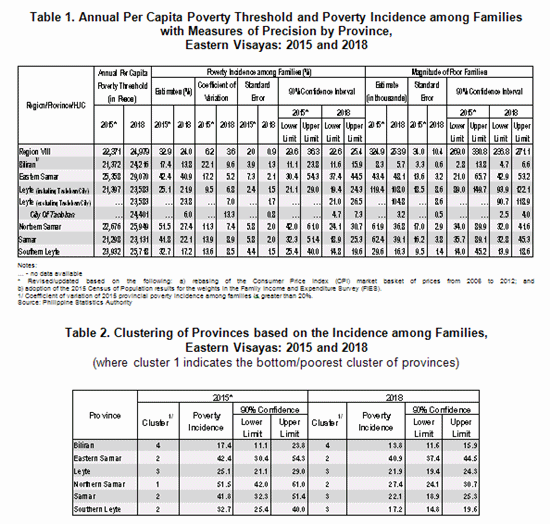
Fisherfolks in
Merida, Leyte receive DOLE livelihood aid
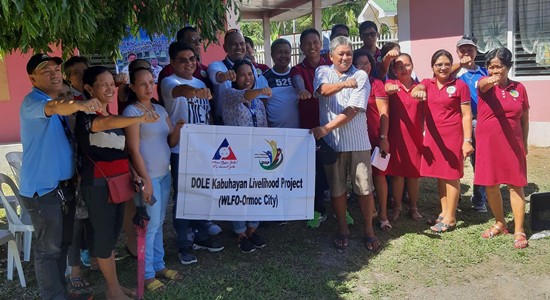
By
NORMA RAE S. COSTIMIANO
January 29, 2020
TACLOBAN CITY – The
Department of Labor and Employment Regional Office VIII through its
West Leyte Field Office successfully turned over livelihood grants
to the Barbara Fisherfolks Association of Merida, Leyte amounting to
P997,450.00 last January 16, 2020 in Brgy. Calunangan, Merida, Leyte.
The Calunangan General
Merchandise Project will be benefitted by some fifty-one association
members who are into fishing and other related activities.
Present to grace the
turnover ceremony were DOLE WLFO Head, Mr. Edgar B. Tabuyan, Mayor
Rolando M. Villacencio, Vice-Mayor Rodrigo M. Wenceslao, PESO
Manager Marita S. Mercadal and Senior Labor and Employment Officer
Rosilito T. Ygaña.
In his message, Mr.
Tabuyan gave his reminders to the beneficiaries. “I hope this
project will inspire you more to work hard. Today is only the first
step because our goal in DOLE is for you to have sustainable
livelihood. In that way only can we really say that we have
contributed in poverty alleviation”, said Mr. Tabuyan.
Mr. Godofredo B. Malinao,
president of the recipient association, expressed his delight during
the turnover of their new business. He said that their merchandise
business is intended to augment the income they derive from fishing.
“Gusto po naming
magpasalamat sa DOLE sa malaking tulong na ibinigay nila sa aming
grupo. Bilang mga mangingisda, hindi po palaging maraming huling
isda. Itong negosyo na pinagkaloob po sa amin ay pagsisikapan at
pagtutulung-tulongan naming mapalago para sa ikabubuti rin naming
mga miyembro pati na po ng amimga pamilya”, Malinao said.
The said livelihood aid
was charged against the 2019 DOLE Integrated Livelihood Program (DILP)
funds of DOLE RO VIII.
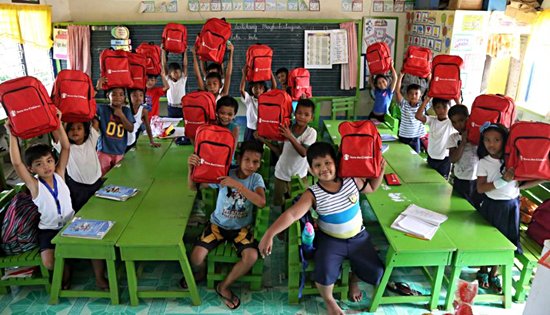
Students
in Cagayan Province showing their back to school kits.
(Photo by LJ Pasion / Save the Children) |
Save the Children
underscores the need for education support for children in armed
conflict and disaster-prone areas
Press Release
January 24, 2020
QUEZON CITY – Save
the Children Philippines has called for stronger support for
education for children trapped in armed conflict and frequently
displaced by natural calamities.
Atty. Alberto Muyot, Save
the Children Philippines Chief Executive Officer, raised the call in
line with the celebration of International Day of Education on
January 24 with the theme: “Learning for people, planet, prosperity,
and peace.”
Every year, some 400,000
adolescents in the conflict affected areas in Bangsamoro Autonomous
Region in Muslim Mindanao (BARMM) do not attend school due to
poverty, according to government figures.
These adolescents also
face different forms of violence as well as recruitment by various
armed groups. At the same time, Save the Children is concerned about
the situation of half a million learners affected by the continuing
eruption of Taal Volcano. These children have been displaced from
their homes while their schools are either heavily damaged by
ashfall or being used as evacuation centers.
“Save the Children
Philippines places education at the forefront of its programs from
development to emergency settings, particularly for children who
suffer from intersectionality of vulnerabilities including learners
with disabilities and indigenous people,” said Muyot.
In the last ten years,
Save the Children has reached more than nine million children
through its programs in health and nutrition, education and
humanitarian response. Of this number, 4.2 million children were
provided support to access quality and inclusive learning
opportunities.
The group implements the
Reach to TEACH program in conflict affected areas of BARMM to
provide education to children affected by armed conflict and those
living in disaster-stricken communities.
The three-year project
(2019-2021) is being implemented in Sulu, Maguindanao, Lanao Del Sur,
Marawi City, Surigao del Sur, Bukidnon and Misamis Oriental. These
provinces have been experiencing protracted conflict for over 10
years due to insurgency, terrorism, rido (clan feud) and pangayaw
(tribal wars).
The program provides
children access to developmentally and culturally appropriate
instructional and learning materials, and train teachers to provide
psychosocial support to learners facing violence due to armed
conflict.
The Reach to TEACH program
seeks to assist children from 46 schools and nine displaced
communities by providing them with learning materials and supplies,
and vouchers for improving attendance and participation.
“When children and youth
from deprived and marginalized situations get equal access to
learning opportunities, education becomes a tool peace-building and
development,” Muyot said.
Sierra Paraan, Basic
Education advisor of Save the Children Philippines said that
inclusion and quality education are the main thrusts of Save the
Children Philippines’ education programs.
“People who do not get a
chance to receive quality education are more likely to experience
socio-economic marginalization and lifelong poverty,” said Paraan.
“Promoting an inclusive culture within the education setting
contributes to the eradication of discriminatory attitudes and
behaviors, further strengthening social cohesion and peace.”
Save the Children also
supports policies that advance non-discrimination and the
realization of inclusive education for all children. Currently, we
are advocating for the enactment of Inclusive Education for Learners
with Disabilities Bill.
AFPSLAI donates
CPR training mannequin to CLSH
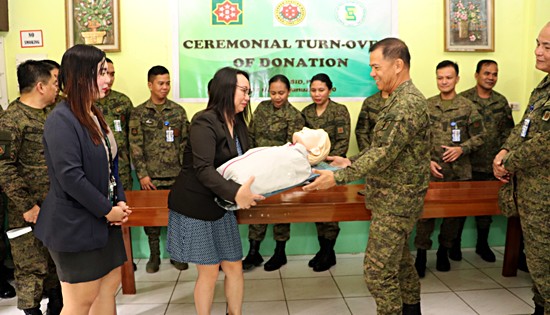
By
DPAO, 8ID PA
January 23, 2020
CAMP LUKBAN, Catbalogan,
Samar – The Armed Forces and Police Savings and Loans
Association, Inc. (AFPSLAI) donated a set of Cardio-Pulmonary
Resuscitation (CPR) training mannequin to Camp Lukban Station
Hospital (CLSH), 8th Infantry (Stormtroopers) Division (8ID) on
January 22, 2020 at 8:30 a.m.
The donation was
personally received by Major General Pio Q. Diñoso III AFP,
Commander, 8ID from representatives of AFPSLAI headed by Ms. Ellen
Jocelyn J. Brazil, Acting Branch Head, AFPSLAI Catbalogan City
Branch. The Ceremonial turnover was witnessed by the Officers,
Enlisted Personnel and Civilian Employees of 8ID.
Commander, 8ID was very
thankful on the donation as it will enhance the future trainings on
healthcare services to be conducted by personnel of CLSH to its
personnel and combat medical personnel of line units.
“This donation will surely
improve the healthcare services training for our personnel
especially in emergency situations. Personnel of line units who are
trained on CPR will also be deployed to conduct rescue operations in
the field in cases of disasters and calamities,” as Commander of 8ID
stated.
DTI launches
livelihood assistance program for disaster victims
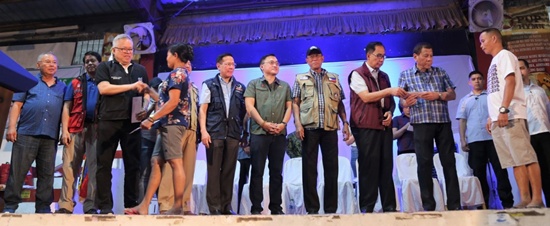
By
DTI-OSEC-PRU
January 23, 2020
BATANGAS – The
Department of Trade and Industry (DTI) launched its livelihood
assistance program, Pangkabuhayan sa Pagbangon at Ginhawa (PBG) last
20 January, when President Rodrigo Duterte’s visited the evacuees in
Sto. Tomas, Batangas. The program will aid the micro entrepreneurs
affected by the Taal Volcano eruption. DTI will soon roll out the
program as an assistance package for victims of fire, typhoons, and
other calamities nationwide.
Under the PBG program, DTI
will provide financial assistance of P10,000 and educational
materials after profiling and giving negosyo training to existing
micro entrepreneurs.
Trade Secretary Ramon
Lopez awarded gift checks to the initial 20 entrepreneurs who are
mostly street food vendors, market vendors, and sari-sari store
owners who want to continue their businesses. Those interested in
the PBG Program may go to the DTI Batangas Provincial Office in Lipa
for an initial assessment.
Among the recipients were
aspiring entrepreneur Carito Ginil, a 45-year-old habal-habal driver
and barangay kagawad, who wants to use his PBG funds to put up an
eatery or a sari-sari store. Meanwhile, 35-year-old worker Joel Cruz
plans to use his to start a manicure/pedicure business for his wife.
“Ang PBG ay inisyatibo ng
pamahalaan at DTI upang matulungan ang mga pinakamaliliit na
negosyante na naapektuhan ng pagsabog ng Taal. Ang paunang puhunan
ay mabilis at madaling pagkukunan ng kapital upang makabalik sa
normalidad ang kanilang kabuhayan matapos ng insidente,” said
Secretary Lopez. [PBG is an initiative of the government and DTI to
help the smallest of entrepreneurs who were affected by the Taal
volcano eruption. The program gives a fast and easy source of
initial capital to help microentrepreneurs regain normalcy in their
livelihood after the incident.]
Secretary Lopez encouraged
entrepreneurs to visit the DTI Negosyo Centers and Provincial
Offices to help them restart or grow their businesses. He said that
after this initial assistance, the awardees can get free training
from DTI as well as low-interest loans through the Pondo sa
Pagbabago at Pag-asenso (P3) program.
|
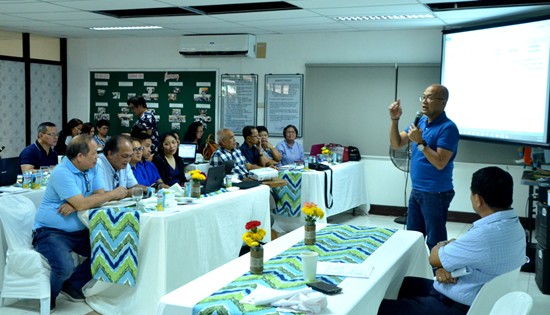
Regional
Director Stephen Leonidas of the Department of Agrarian
Reform in Eastern Visayas commended the Land Tenure Service
sector during the regional assessment for accomplishing 160
percent of their target in Land Acquisition and Distribution
in 2019, and challenged them to deliver 50 percent of their
2020 target during the first quarter. |
DAR-EV hits 160
percent of their target in 2019
By
JOSE ALSMITH L. SORIA
January 22, 2020
TACLOBAN CITY – The
Department of Agrarian Reform (DAR) in Eastern Visayas accomplished
160 percent of its 2019 target in land distribution.
Engr. Francisco Diloy,
chief of the Land Tenure Service (LTS), reported during last week’s
regional assessment that a combined area of 3,282 hectares of
private agricultural lands had been issued with certificates of land
ownership award (CLOAs) and registered at the Registry of Deeds
(ROD) in the names of 1,564 qualified agrarian reform beneficiaries
(ARBs) throughout the region last year.
He stressed that last
year’s accomplishment in Land Acquisition and Distribution (LAD) was
60 percent over their 2019 target of 2,050 hectares.
According to him, DAR
Leyte Provincial Office, headed by Provincial Agrarian Reform
Program Officer (PARPO) Renato Badilla, contributed the most to the
region’s accomplishment with 2,986 hectares, which is 175 percent of
their target.
Samar, Northern Samar, and
Southern Leyte delivered 145 hectares, 125 hectares, and 25
hectares, respectively.
Further, Diloy reported
that his sector likewise accomplished more than 100 percent in other
activities, such in Claim Folder Preparation and Documentation,
Surveys, and Land Valuation, as well as in non-LAD activities.
Meanwhile, Regional
Director Stephen Leonidas commended the efforts of the LTS, however,
for the current year, he challenged the said sector to deliver 1,000
hectares or 50 percent of the annual target during the first
quarter.
When Leonidas assumed
office in September last year, he evaluated and resolved issues on
landholdings with field investigations conducted in 2018 covering
2,000 hectares and targeted for distribution this year.
Meanwhile, on Agrarian
Reform Beneficiaries Development and Sustainability Program (ARBDSP),
Chief Agrarian Reform Program Officer Melecia Ong reported that her
sector likewise hit more than 100 percent of their targets in 2019.
According to her, 24,373
ARBs throughout the region were exposed to various livelihood and
organizational trainings, which is 152 percent of their 16,031
target.
She added that more than
14,000 ARBs were given access to credit and microfinance, which is
128 percent of their target last year.
Further, Ong said that 226
ARB organizations or 156 percent of their 2019 target were provided
with technical, enterprise, farm and physical infrastructure
support, while 20 ARB organizations were provided with farm
machineries and equipment under the Climate Resilient Farm
Productivity Support (CRFPS).
On Agrarian Justice
Delivery (AJD), Leonidas also commended both the Legal Division and
the DAR Adjudication Board for resolving pending agrarian-related
cases in 2019.
|
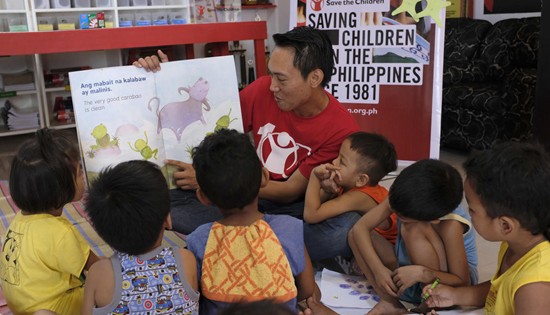
Save
the Children staff leads a session for children at the
mobile Child Friendly Space set up in the evacuation centre
in Balayan, Batangas, Philippines.
(Photo by LJ Pasion /
Save the Children) |
Erupting volcano
may leave children homeless for months, warns Save the Children
Urgent need for temporary
schools for pupils who are missing out on classes
By
Save the Children
January 22, 2020
MANILA – Half a
million people made homeless by the Taal volcano eruption will need
immediate and long-term support as they face growing uncertainty
over whether they will ever be able to return to their towns and
villages.
As the volcano continues
to erupt, Save the Children is warning of a prolonged crisis that
could see hundreds of thousands of people unable to return to their
homes for months and forced to live in evacuation centers or with
friends and relatives. The Philippines government estimates that in
the worst case scenario, communities may not be able to return for
up to seven months, though that could change should there be a
catastrophic eruption.
According to government
figures, at least 580,000 pupils from more than 1,000 schools have
been missing out on classes for the past two weeks due to heavy
ashfall in the provinces around the volcano and schools being used
as evacuation centers. Of this figure, an estimated 55,000
schoolchildren come from the six abandoned towns located in the 14km
danger zone, where many classrooms are damaged and buried under
hazardous ash. Many of these students could fall behind and miss
graduation in three months, affecting their future job prospects.
Meanwhile, more than 300 schools are still being used as evacuation
centers.
Nearly 3,000 hectares of
agricultural land – the main source of livelihood for people living
near the volcano – is now covered in thick hazardous ash, crops are
ruined, and thousands of homes and schools have been severely
damaged and will require rehabilitation. Thousands of farm animals
have also died.
Jerome Balinton,
Humanitarian Manager for Save the Children Philippines, said:
“We are concerned that
thousands of children may not be able to return to their homes and
communities for months, with many final year students risking
missing their graduations. Being made homeless puts these children
at serious risk of abuse and exploitation. Children in the
evacuation centers are forced to bathe with little or no privacy,
sharing the same facilities as adults. Mothers have told Save the
Children they’re worried for their teenage daughters, many of whom
don’t have any sanitary pads or even underwear as they were forced
to flee quickly when the volcano began erupting.
“The emotional and
psychosocial stress of being made suddenly homeless and surrounded
by so many strangers in such close proximity are taking a toll on
children. It’s vital that we meet their immediate needs for food,
clothing, clean water, hygiene and healthcare, while recognizing
that they need long-term solutions as well. This means setting up
temporary schools so children can return to a normal routine while
they wait for the fury of the volcano to subside.”
Save the Children is
distributing family household and hygiene items to families. We have
also set up mobile child-friendly spaces where children can learn
and play in a safe environment while receiving emotional support.
The Philippines government
has imposed mandatory evacuation for six towns around the volcano,
forcing at least 300,000 people – of whom 124,000 are children –
into one of the more than 450 evacuation centers. The government
believes a deadly and destructive eruption is ‘imminent.’
ACT slams P36B
budget for NTF-ELCAC amid calamity fund cut, measly pay hike
By
Alliance of Concerned
Teachers
January 21, 2020
QUEZON CITY – The
Alliance of Concerned Teachers (ACT) Philippines slammed President
Duterte’s granting of P36.439 billion to the National Task Force to
End Local Communist Armed Conflict (NTF-ELCAC), a formation that was
built to implement the ‘Whole-of-Nation’ approach to ending
insurgency in the country as directed by Duterte’s EO 70.
The task force’s budget
was P3 billion more than the P33.2 billion provided for the 2020 pay
hike of civilian government employees, and was P20 billion more than
the P16 billion 2020 calamity fund, after it was slashed by P4
billion during the budget deliberation. The teachers’ group
criticized Duterte’s prioritization of war over people’s welfare.
“We are enraged that the
Duterte’s NTF-ELCAC, his main fascist machinery that has militarized
the bureaucracy, gets a huge chunk of people’s coffers. Meanwhile,
the calamity fund was significantly slashed and the pay hike budget
for 1.5 million civilian employees was prudently provided for in the
2020 budget. Such leaves us vulnerable in times of crisis, like now
that we are facing the tragedy of the Taal volcano eruption. The
government’s neglect has never been more evident, and the people’s
collective power ever more powerful as we are left to rely on each
other,” said ACT Secretary General Raymond Basilio.
Additionally, ACT argues
that the people shall likewise unite to hold the Duterte
administration accountable for its abandonment of the people and
failure to do its duties. ACT further posits that the government
‘kills us twice over – through his wars against the people,
especially the poor, and by denying us our basic rights to social
and economic services.”
ACT furthered that the
NTF-ELCAC not only takes resources away from necessary services to
the people, it also poses a threat to democracy as it was allegedly
responsible for the series of political attacks against dissenters
and those fighting for their rights, such as ACT and other
individuals and organizations.
“The NTF-ELCAC and its
regional formations have launched a campaign to vilify and red-tag
ACT and teacher-unionists in several regions. We’ve documented
reports of the said task force holding symposia and fora in which it
tags our and other progressive organizations as communist fronts.
Our leaders have been subjected to surveillance, threats, and
harassments, and then being given copies of EO 70 and being told
forced to ‘surrender’ to the government,” exposed Basilio.
Basilio added that the
NTF-ELCAC utilizes the entire bureaucracy in its attempts to quell
people’s rightful unrest and democratic exercise of rights amid the
economic and political crisis befalling the country through
vilification, intervention, and fascist measures. ACT said that the
task force’s ultimate objective is to establish Duterte’s tyrannical
rule, hence the President’s pouring of resources to the NTF-ELCAC.
“Therefore, teachers’ just
fight for decent pay, better benefits and services for all serve
more than just the economic interests of the people but also
contributes to the frustration of Duterte’s drive for absolute
power,” declared Basilio.
ACT underscored that the
NTF-ELCAC is a fascist machinery that must be dismantled.
“Should there be any
sincerity to the government’s desire to end the 51-year war in the
country, it should address the roots of armed conflict beginning
with opening the peace talks again with the National Democratic
Front of the Philippines and signing the CASER,” urged Basilio.
CASER is the Comprehensive
Agreement for Socio-Economic Reforms, which provides for genuine
agrarian reform and national industrialization, among others. It
also provides for the granting of decent wages and salaries to
workers.